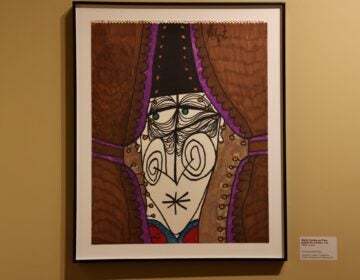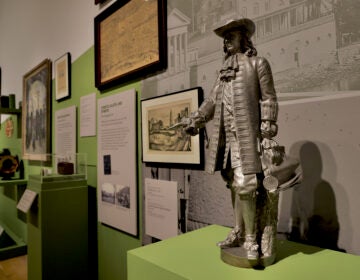Philly History Museum’s future may lie with Drexel
More than 300 people turned out Wednesday night to hear a plan for preserving the contents of the Philadelphia History Museum. The building, however, may be lost.
Listen 2:13
More than 300 people turned out to hear about a proposal to save the collection of the Philadelphia History Museum. (Peter Crimmins/WHYY)
Philadelphia’s historical collection could go to Drexel University under a plan aired Wednesday night before a crowd of more than 300. While touchstones of the city’s storied history would be preserved, the building that’s housed them for 80 years may not.
The Philadelphia History Museum at the Atwater Kent on Seventh Street closed last summer due to a lack of funding.
For years, the city has been trying to partner with an institution to prop up the ailing history museum. In 2014, officials were talking with the Woodmere Art Museum in Chestnut Hill; in 2016, they spoke with Temple University. Both ended without a deal.
Philadelphia Chief Cultural Officer Kelly Lee said the current talks with Drexel have come along far enough to solicit feedback from the public.
Hundreds packed the meeting at the National Constitution Center to hear firsthand what might happen to the history museum and its collection of more than 130,000 objects, ranging from the Lenape tribe wampum belt that was given to William Penn in the 17th century to George Washington’s presidential desk to boxing gloves once owned by Joe Frazier.
In attendance were a who’s-who of the region’s cultural institutions, from the Woodmere Museum to the proprietors of a vintage 19th-century ice cream parlor in Old City.
Drexel University Vice Provost Rosalind Remer laid out the proposal under which the university would take ownership of the collection. It would be responsible for culling unwanted items, acquiring more items, properly maintaining the collection, and making it available for loans and research.
“Something like Switzerland, we are neutral with no specific aspirations for these collections beyond their protection, proper management, and increased accessibility to the public,” she said.
Drexel is a member of the American Association of Museums, which establishes ethical best practices, she noted.
Meanwhile, Drexel would acquire one of the most robust historic collections of any city in America as it aggressively expands its humanities assets. In 2011, it acquired the Academy of Natural Sciences, the oldest science research institution in America. The Philadelphia history collection could be leveraged as a teaching aid for students and a platform for community engagement.
“A point that [Drexel] President [John] Fry asked me to be sure to make: Drexel aims to be – this is modest – the most civically engaged university in the country,” Remer said. “Stewardship of the Atwater Kent collections at Drexel University is consistent with this goal.”
The plans involve a thorough assessment of all the objects in the collection, establishing a panel of experts to decide about accessions and deaccessions, and creating a robust website for researching the collection and requesting items.
Drexel would hire a staff to maintain the collection. The city would pay Drexel the necessary costs for the first few years, then the university would be expected to raise the funds to maintain and expand the collection — and make it accessible.
The proposed deal does not include the building on Seventh Street, the Atwater Kent building where the museum has operated since 1938. Drexel has no plans to acquire that building nor establish any dedicated physical space to exhibit the city’s collection, only the ability to loan out items.
For many, that is a bitter prospect.
“This was not an easy decision for us to come to. None of us wanted to be here,” said City Managing Director Brian Abernathy. “We are trying to find the best path forward to maintain [the collection] … because we’re not anything without being able to tell the story of our neighborhoods.”
The lack of a museum to exhibit the city’s collection struck a nerve with many people in the room who pushed back against the proposal with no strategy for a physical space.
One of them was Janet Burnham, who used to volunteer at the Atwater Kent.
“It was a place where swarms of schoolchildren came and touched stuff,” she said. “They learned that museums were places for them. Keep that in mind, because we lost a treasure when the museum closed.
Speakers remained respectful, but their passion and disappointment was palpable.
“My name is Frank Hober, I live in South Philadelphia, and I’m very angry,” said the lifelong Philadelphian who remembers clearly his first visit to the Atwater Kent in 1950, when he was 8 years old. “Despite its unparalleled collections, the museum has never been able to live up to its potential because it has been chronically underfunded by successive administrations.”
The proposal, however, is not a done deal. The city and Drexel are accepting feedback from the public online through March 20.
WHYY is your source for fact-based, in-depth journalism and information. As a nonprofit organization, we rely on financial support from readers like you. Please give today.





